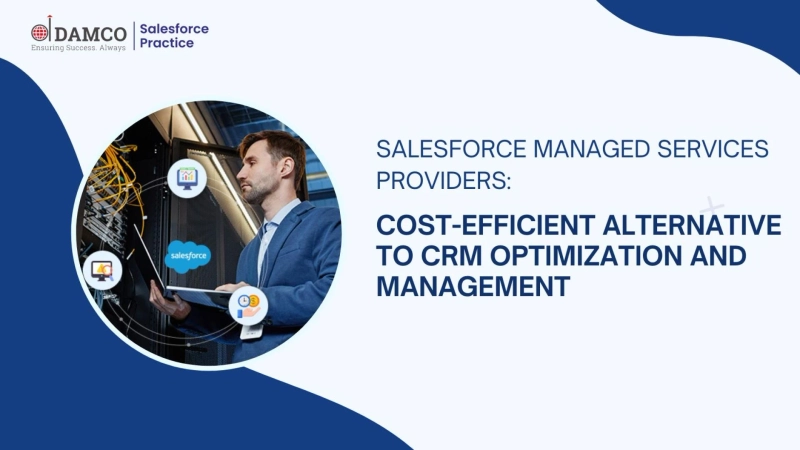When it comes to CRM, Salesforce is the most preferred choice of businesses. Whether it is about managing customer relationships or sales teams, providing exceptional customer service, or getting analytical support, Salesforce has a solution for everything. Its vision to transform customer services and robust functionalities such as industry-specific offerings helps organizations scale growth.
Salesforce becomes difficult to manage when an organization first transits to it. This is because mere implementation and customization of the cloud-based solution isn’t enough, it needs to be optimized and upgraded with the latest features. There arise challenges like trouble transitioning to new technologies, a growing backlog of projects, a complicated IT environment, poor performance and compliance issues, and unrealized ROI. This is where managed services come to the rescue, which is like outsourcing Salesforce support and maintenance activities to dedicated professionals.
An Insight into Salesforce Managed Services
Managed services model leverages the proactive approach to help enterprises run their CRM smoothly. And, Salesforce-managed service providers are firms that specialize in providing ongoing support and maintenance for Salesforce instances, just a call away and at lesser costs. They offer an array of services to help companies optimize their Salesforce usage, improve system performance by adding enhancements and modernizing it with new releases, and ensure smooth operations.
Listed below are some of the common services offered by Salesforce managed service providers (MSPs):
System Administration: MSPs can efficiently handle your day-to-day administration tasks including user management, data management, security settings, and customization to name a few.Support and Issue Resolution: Managed services companies offer technical support to identify and fix issues if there are any or answer questions users may have with the Salesforce product, platform, or features. They offer assistance through multiple channels, including chat, email, and phone.
Configuration and Customization: To ensure optimal usage, MSPs tailor Salesforce solutions to meet specific business needs by configuring the platform and developing custom functionalities using declarative tools like custom objects, process builders, and workflows.
Integration and Data Management: These service providers can help you integrate Salesforce with other systems and third-party apps including ERP or marketing automation platforms to maintain a seamless data flow between applications. The experts also assist with data cleansing, data migration, and ongoing data management.
Release Management: As a part of their core competency, MSPs stay up to date with the latest Salesforce releases and are responsible for managing the deployment of new features and updates to the platform. For a smooth and hassle-free transition to new versions, professionals also handle testing, sandbox management, and deployment planning.
Training and User Adoption: Salesforce-managed service providing companies also offer training programs to help users understand Salesforce and maximize its benefits. They give user adoption strategies, and training materials, along with workshops, if need be, to ensure organizations get the most out of the implementations.
System Performance Monitoring and Optimization: MSPs keep a check on system performance, identify bottlenecks, and optimize Salesforce configurations to enhance efficiency and improve user experience. In addition, they analyze usage patterns, provide performance tuning, and recommend best practices.
Reporting and Analytics: These providers help businesses to create customized reports and dashboards to track key performance indicators (KPIs), measure success, and gain insights from Salesforce data.
Advantages of Managed Service Salesforce
Salesforce-managed services are an economical, flexible, and reliable way to maintain and manage Salesforce instances. Some of the key advantages of collaborating with Salesforce MSPs are as follows:
Expertise and KnowledgeManaged-service providing companies have a pool of skilled and experienced professionals with deep knowledge of the Salesforce platform, products, and features. They have certifications and expertise in system administration, development, customization, and optimization. Businesses can leverage their skills and knowledge to be assured that their Salesforce implementation is well-managed and optimized according to their unique needs.
Cost SavingsYou can either burden your in-house IT team, hire an in-house Salesforce team, or engage a Salesforce MSP with Salesforce administration tasks. Out of all these approaches, managed service providers offer flexible pricing models, becoming a cost-friendly alternative to the other two options. Here, businesses need to pay for the services they need without the overhead costs associated with hiring and training full-time employees.
Focus on Strategic InitiativesOutsourcing Salesforce support and management activities to a managed service provider enables businesses to focus on their core competencies and strategic initiatives. With the day-to-day management and support taken care of, internal resources can be reallocated towards more value-added activities, improving overall efficiency and productivity.
Proactive Monitoring and Prompt Issue ResolutionProfessionals proactively monitor the health and performance of your Salesforce instances. They can identify and fix potential issues before they become significant problems for your organization; thereby ensuring that your system operates smoothly and efficiently.
Scalability and FlexibilitySalesforce-managed service providers offer scalability and flexibility to accommodate your changing business needs. Whether you need to handle seasonal spikes in user activity, integrate new systems, or expand your Salesforce implementation, they can quickly adjust and scale their services accordingly.
Access to Advanced Features and UpgradesAs a customer-centric solution, Salesforce releases regular updates and new features three times a year to enhance the platform's capabilities. Managed service providers stay up-to-date with these changes and make sure that your implemented instances are always leveraging the latest advancements. They can help you take advantage of new features and functionalities, streamlining your overall business operations.
Timely Support and Issue ResolutionSalesforce MSPs provide timely support and issue resolution to end-users. They have assigned dedicated support teams to troubleshoot problems, address user queries, and provide guidance on using the Salesforce platform effectively. This results in maximized employee productivity and minimized business downtime.
Conclusion
Overall, Salesforce managed services help firms optimize their Salesforce implementation, reduce costs, and leverage the expertise of experienced professionals, resulting in improved operational efficiency and better utilization of the Salesforce platform.
When selecting the best Salesforce-managed service providers, consider their expertise, experience, customer references, service level agreements (SLAs), and pricing models. It's imperative to choose a provider that aligns with your organization's needs and can sufficiently support your Salesforce implementation.


